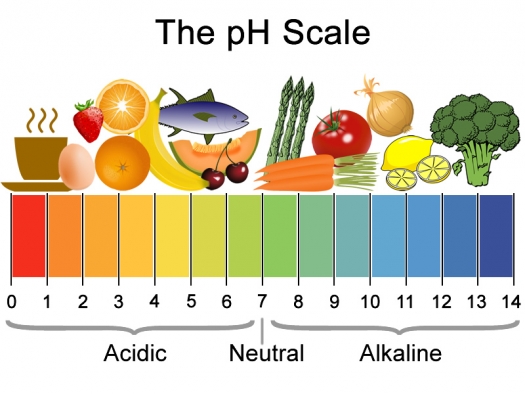pHbalancediet.jpg

Illustration by FAIM, 2016 / CC0
The Western diet places heavy emphasis on commercial animal proteins and processed, grain-based carbohydrates that have a low nutritional value. This way of eating is often referred to as the Standard American Diet (SAD) – a fitting acronym. In addition to drug-filled animal products and pesticide-laden produce, the SAD is often full of processed food toxins, packaging chemicals, estrogen-mimicking compounds, residual heavy metals and artificial and highly refined ingredients. Over time, this type of diet can produce a chronic inflammatory, overly acidic state in the body and can lead to metabolic diseases, cardiovascular and weight conditions, cancer, dementia – the list goes on.
Maintaining balance
Your overall health depends on precise balance, and maintaining the right pH balance is one of these keys. The abbreviation pH refers to the “potential of hydrogen,” a measure of acidity.
Hydrogen ions contribute acidity to any tissue or organ, such as the contribution of hydrochloric acid to acidic stomach secretions. The scale used to measure pH is a logarithmic scale. So there is a tenfold difference between each number ranging from 1 to 14. The lower numbers (1-6.99) represent the acid (or H+ donating) range, and the higher numbers (7.01-14) represent the alkaline (or H+ accepting) range. Neutral is 7.0. Some body systems such as the blood (7.35-7.45) are more tightly regulated than others. Urine has a broader pH range, from 4.5-8.0, which makes it an ideal body fluid for keeping track of dietary adjustments in pH.
Being too acidic compromises health and contributes to a number of chronic degenerative conditions, including gastrointestinal issues, suppressed immunity, osteoporosis, kidney disease and muscle wasting. For example, the body uses bone tissue to buffer acidity, and bones can be weakened when the alkaline minerals calcium and magnesium are removed to keep the body in the proper alkaline balance. Increased calcium excretion from bone also increases the risk of kidney stones.
Food affects your pH levels
Dietary modifications can help maintain the right pH within the body’s various systems, so the foods you eat have to include the ones that support organs that work so hard to maintain pH values within their optimal ranges.
A high intake of vegetables, which are for the most part alkalinizing, can neutralize over-acidity and positively influence your bone metabolism, strengthening the skeleton by increasing the retention of phosphates and calcium and reducing bone depletion.
These lists of food can help you tell which ones are more acid forming and which are more alkaline. Most fruits are acid forming, with the exception of a few such as lemons and limes. Lemons and limes certainly have acidic properties, but are actually alkalizing once digested. That is why lemons and limes are so highly recommended during a seasonal cleanse or detoxification program.
Highly alkalizing foods
Himalayan salt, grasses, cucumber, kale, kelp, spinach, parsley, broccoli, sprouts (soy, alfalfa etc.), sea vegetables (kelp), green drinks, sprouts.
Moderately alkalizing foods
Avocado, capsicum/pepper, mustard greens, cabbage, okra, celery, onion, collard/spring greens, radish, red onion, ginger, endive, garlic, rocket/arugula, tomato, butter beans, soy beans, lime, quinoa, lemon, white haricot beans, chia/salba seeds, green beans, beetroot, lettuce.
Mildly alkalizing foods
Artichokes, asparagus, Brussels sprouts, cauliflower, carrot, chives, zucchini, leeks, new red potatoes, peas, rhubarb, swede, watercress, buckwheat, spelt, lentils, tofu, almond mild, most herbs and spices, olive oil, coconut oil, flax oil.
Mildly acidic foods
Black beans, kidney beans, garbanzo beans, cantaloupe, currents, dates, nectarine, plum, cherry, amaranth, millet, oats, spelt, rice, soy, hemp protein, freshwater wild fish, brazil, pecan and hazelnuts.
Moderately acidic foods
Butter, apple, apricot, banana, blackberry, cranberry, grape, mango, peach, orange, papaya, pineapple, strawberry, brown rice, wheat, wild rice, ocean fish.
Highly acidic foods
Alcohol, over-the-counter and prescription drugs, coffee, tea, cocoa, sugars and sweeteners, dried fruit, beef, chicken, eggs, farmed fish, pork, shellfish, cheese, most dairy (except raw dairy which can be slightly alkalizing), mushroom.
Your home ph lab
You can buy pH test strips at your local pharmacy or online, so you can experiment with testing your urine and saliva to see what your results are after eating certain foods.
Think of yourself as your own laboratory, and experiment with different foods and testing times. Studies have shown that urine pH can show modifications in as little as two hours after a meal. Your goal is to be in the green or slightly alkaline range, which should be fairly easily accomplished with a diet high in green leafy vegetables (alkalinizing foods) and lower in proteins and carbohydrates (acidifying foods).
Role of potassium, magnesium and calcium
The best way to increase your alkalinity is to balance your diet. Emphasize nutrient-dense, complex carbohydrates, along with smaller portions of organic and grass-fed meats and high-quality plant protein sources such as sprouted, fermented grains and legumes.
Alkalizing minerals, such as potassium, magnesium and calcium, are best obtained from organic food sources. Emphasize red potatoes, avocados, Brussels sprouts, green leafy vegetables, broccoli, sea veggies and green drink powders.
While sodium bicarbonate (baking soda) is often recommended for alkalinizing, studies show that potassium bicarbonate and potassium citrate have a much more protective alkalizing effect. Potassium chloride on the other hand, which is commonly found in processed foods, does not have the same alkalinizing ability as potassium citrate.
Studies conducted on postmenopausal women show that potassium chloride can weaken bones, while potassium citrate increases bone density and is more effective in reducing calcium excretion in the urine. Products like Alkala provide a combination of potassium and sodium bicarbonates, and can be used to help maintain alkaline urine and promote better detoxification. Always check with your healthcare provider before using any concentrated mineral supplement such as this. Some conditions or drugs can cause an accumulation of potassium or sodium in the body, which can be dangerous for certain individuals.
We also recommend comprehensive multinutrient formulas with synergistic blends of minerals, vitamins, nutrients and botanicals. Such formulas can help support optimal nutrition, bone strength, hormone balance, detoxification and other targeted areas of health for men and women.
To achieve and maintain optimal long term health, it all comes down to balance. Our bodies work hard to maintain very precise levels of balance and homeostasis within our complex systems. When things are in harmony, we feel our best, with radiant vitality, clarity and well-being.
Originally published on Dr. Isaac Eliaz's website, November 4, 2011. Used with permission.


